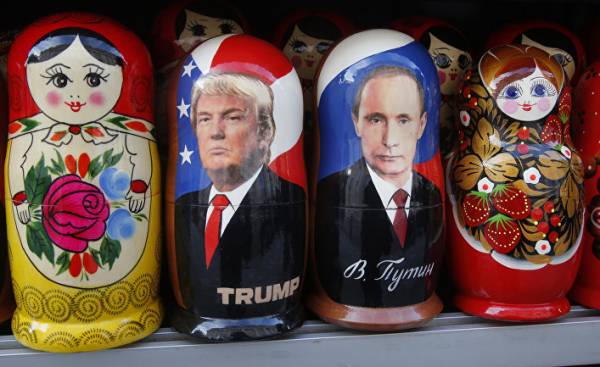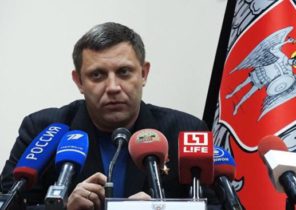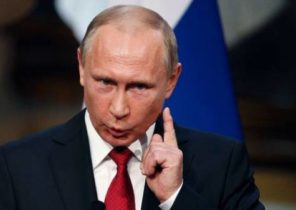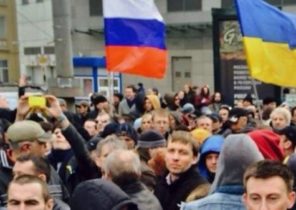
Americans are bombarded every day news about Russia. The CIA and the FBI are convinced that in the course of elections in 2016, the Russian authorities stole information from the computers of the National Committee of the Democratic party to stop Hillary Clinton to win and to help the Donald Trump. The Committee on intelligence of the Senate and house of representatives are investigating the interference of Russia in the elections. Reporters dig up contacts and meetings between people from the environment trump and Russian officials, which has already led to the resignation of trump’s Advisor on national security and endangers the future of the attorney-General Jeff and Roman sessions (Jeff Sessions).
Russia is present in all the papers. But how to perceive this sensation of ordinary Russians and what they think of the charges in their country charges?
Ellen Mickiewicz (Ellen Mickiewicz), a political science Professor from Duke University, examines the consumption of news in Russia and in America. Her latest book “No illusions” (“No Illusions”) dedicated to the ideology of students in prestigious Russian universities. In the new edition of this work will include a significant amount of data about how Russia is using news as a weapon.
Miscavige carefully examines the mood in Russia, using focus groups, covering different social strata, from elites to ordinary people from all over the country. While she tries not to go into the room with the focus group to the presence of foreigners did not affect the reaction of participants.
We talked to Miscavige about how the Russians perceive the news about trump and about the United States, and what she thinks about the recent wide interest in outreach state news channel Russia Today.
Karen Turner: could you start by telling what I think in Russia about the United States?
Ellen Mickiewicz: After the Soviet period the Russians for a long time been good to America. Judging by all the polls conducted, a good feeling for her to have experienced more than 70% of respondents. Then, in 1999, the us began the bombing of Serbia, and of sympathy for the United States decreased among the General population and among the elites.
I see two reasons. First, to the beginning of the bombing, the United States became the most powerful country in the world. The Soviet Union was dead. The Russian Federation suffered from a severe economic crisis. It seemed to many that the United States dispose on the planet without any restrictions, because no country powerful enough to restrain their tyranny. Thus, in part, this was a real fear. Thus, in particular, thought by many leaders and elites.
Those who were on the lower levels of the social hierarchy, in turn, wondered whether something to stop these bombing and who could be the next target. Among them, have spread fear and insecurity, they feared that shortly the bombs can start to fall on Russia. That is, it was at the same time about the concern associated with global issues, and fear of immediate personal security.
— What ordinary Russians and the Russian elite think about Putin? As they relate to his style of management?
— I judge it on the basis of methodologically conscientious research, and not just General impressions from walking the streets — although such experiences, of course, I also have. The Russians understand very well aware that they have no choice. They know that in the parliamentary elections they have no real ability to choose. The turnout last time was a record low, despite all the efforts of the media calling people to come and vote. They just didn’t come.
Sometimes in the West, saying judgemental tone that people do not oppose the regime, not start a revolution, not to overthrow the government. However, the Russians know that there is no choice. No challenge the system from within is impossible. For them it is obvious.
Further, ordinary people in Russia very difficult life. Everything they earn they spend on survival and the fact that they had enough food and clothing. Especially expensive medicines, because they are small. Overall, the country has a hard life, and the people are mainly focused on overcoming these difficulties. This is no alternative, what is happening is not visible. People just know it.
As shown by recent polls, most Russians believe that Putin’s government is not able to solve economic problems. But what can make every single person? This is a key question. President Putin is going to get re-elected. In the West, many would say that it is now time to think about elections and start preparing to it, but in reality, on the horizon there is nothing that would indicate it.
— I read that Putin’s popularity remains high.
I think those who see the corresponding figures or hear about them, often take them on the move at face value, without trying to find out what is really behind them. Think about how to carry out these surveys. Internet polls are virtually impossible, because computers were not widely circulated. The country is not completely saturated even phones. Therefore, we have to interview the old-fashioned way. Sociological service just send people a folder of papers in his hands to knock on doors and ask questions. Imagine that the Respondent stranger comes and asks if he likes President Putin. Given the social pressure response in this case will not necessarily reflect true feelings.
From 2001 to present, answered that they are indifferent to Putin or that they still, every year, more than those who like Putin. If we ignore this group, then “like” will of course occur more frequently than “don’t like”. But this in itself means little. If I were a journalist I would have asked in the first place, how to conduct the survey, how to ask questions, not afraid to answer honestly. These are all very important factors.
— What can you say about how the Russians relate to allegations of computer hacking? Because these allegations concern not only the American elections, but Ukrainian, and French.
Russians at all levels, but especially the elite, negatively react to the demonization. For example, today I watched the Russian news, and it said on the CNN program, in which Putin was named the most powerful man in the world. Or remember how previous the United States representative to the UN, Ambassador Samantha Power (Samantha Power) called the Russian diplomats thugs and murderers. Such statements cause the Russians have an extremely hostile reaction. They often ask why the Americans they demonize.
As the result of statements about the hacks they perceive as a continuation of the same trend. I think their just new insults, demonization, as they say in Russia. Really, charges so much that they are impossible to understand and to separate from the sounding convincingly demonize. Accordingly, people are just completely reject any claims of the United States.
Whether they believe in computer break-ins? They do not believe in privacy. Point. This applies particularly to the elites. They know that privacy does not exist — neither in Russia nor abroad. They’ve seen it all. They lived in the Soviet Union.
The President’s rating trump among Russians is rising, then falling. This is indicated by a number of different polls, which I believe is credible — in particular, the study of “Levada-center”, is characterized by good methodology. When trump makes statements that sound conciliatory, polls show an increase in the rating by a few percentage points. Then the President says something else, and the rating drops. While he never reaches values that were characteristic of the time before the bombing of Serbia, and never reaches the indicators to be considered a “friendly”. The Russians, without any doubt, believe that they have enemies and not inclined to believe coming from the enemies charges.
— Let’s talk about Russian news sources and about which news is consumed by the Russians.
— When the focus groups it comes to Russian television, the elites usually say that “there is one big lie.” Therefore, they go on the Internet and cross-checked with other sources — the Economist, The Guardian, Agence France-Presse, National Geographic, etc. the Coverage of journals is very wide, but, according to respondents, otherwise it is impossible because the truth can not even come close, if not to compare different sources, different reports on the topic. Russian media is not considered deserving of special trust. Note that these things require a lot of effort. However, people engaged in work and devotes a lot of time training her, however, spend effort on mapping information.
Then there is Russia Today, RT. Is news primarily for external audiences. Now, in the intelligence community, many fear that RT is undermining Western institutions and democratic processes. Against this background, I would like to appeal to common sense.
In Britain, other European countries and in the US, RT looks a tiny audience. The American intelligence community is very concerned that the rollers RT collect a huge number of views on YouTube. It’s actually true, but RT just buys the video in other countries, it is decorated with their logo and promotes in the search engines. This means that 81% of material RT that people watch on YouTube, filmed in other countries and focuses on local issues. Usually it’s the rollers with catastrophes such as the explosion at Fukushima, violence and other attracting the attention of the public stories. Important political issues they address are rarely.
No, of course, those who agree with the point of view of RT, it is purposefully prepared to consume. They adhere to — and is specifically looking for her. However, the assumption that people who do not agree with it, from watching the forever changing world that requires evidence. Meanwhile, to examine this issue, no one even tries. In my opinion, people are too sensitive to the content of RT, almost — or at all — with no evidence that this content does something to the viewers who do not agree with him or not interested in them.







